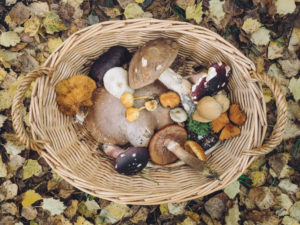 When most of us ponder the mushroom, we tend to think along the lines of either yummy garlic sautéed mushrooms, trippy psychedelics, or poisonous death fungus. The truth is that mushrooms come in all of these varieties, and so many more!
When most of us ponder the mushroom, we tend to think along the lines of either yummy garlic sautéed mushrooms, trippy psychedelics, or poisonous death fungus. The truth is that mushrooms come in all of these varieties, and so many more!
A class of mushroom that has been underutilized in the past, and are finally coming to the fore, are medicinal mushrooms. These are truly superhero mushrooms. Though they have long been used in Chinese, Japanese, and Eastern European medicine traditions as adaptogens, Western medicine is just catching up to the health benefits of these mushrooms.
Thought to impact our immune system, even common edible varieties like the Shiitake and the Oyster, mushrooms have compounds that resemble microbes. Our vigilant immune cells sense this and respond by increasing innate immune activity (our front-line immune response). On high alert, our immune system gets a “workout”, making it stronger over time.
It is in this sense that mushrooms tend to prime or support immune function, and they do so in a way that is normalizing to the immune system, as opposed to being an aggressive stimulant. Mushrooms have a lot to offer in terms of overall health.
You can think of them as immune tonics that are applicable in a wide variety of situations, including-
- Lowered resistance and “catching things” easily, so they work to build you up
- Chronic or persistent infections, they strengthen your immune system
Rock Stars for our immune systems, mushrooms also help support other areas of the body. The nervous system, liver, cardiovascular system all benefit. They are packed with antioxidants and anti-cancer fighting properties.
 Before we dive into discussing different mushrooms here’s a few things to note:
Before we dive into discussing different mushrooms here’s a few things to note:
When drinking or taking medicinal mushrooms the first thing to know is that they have to be heated in order to be bioavailable.
The fungal cell wall is indigestible, and heat allows the cell wall to break down in order to access their nutrients. There are supplements available on the market in the form of capsules and extracts.
You can also prepare teas using mushrooms. In fact, this is the traditional way that they were prepared as immune tonics. Mushrooms are easily obtained in dried and sliced forms, which is perfect for making tea.
Dosages
Adding a spoonful of mushroom powder to your favourite recipes is a great way to reap their magical health benefits. It’s also best to keep the dosage just at that — a spoonful, or 1 to 2 tablespoons per day. Even if you do feel a boost in your health, keep to small dosages. Mushrooms are still waiting more trials to verify their benefits and some studies raise concerns that large doses of reishi extract, for example, may be associated with liver damage. Certain mushrooms may also cause upset stomach or allergies if taken in large doses.
 When you’re looking to purchase a mushroom supplement, there are some things to consider:
When you’re looking to purchase a mushroom supplement, there are some things to consider:
- source organic mushrooms: mushrooms can accumulate heavy metals organic really is best here
- make sure that the mushrooms have been heated for nutrient bioavailability
- if purchasing an extracted product, make sure that both water as well as alcohol are used – alcohol is important to extract many of the important compounds
If you’re using certain medications, you are pregnant or breastfeeding always talk to your doctor beforehand to confirm if adding medicinal mushrooms to your diet is safe.
Let’s now take a closer look, into some of the key mushroom species that are frequently used and their suggested health benefits.
PLEASE NOTE
While there are references for some of the health claims below, bear in mind for the purposes of this blog this list is not extensive by any means. We recommend that if you wish to use mushrooms for medicinal purposes rather than a simple wellness boost, you explore health claims further, and speak with a medical or holistic health practitioner. Eastern medicine has utilised several varieties of mushroom for centuries, and you’ll easily find a number of published reviews and studies with a little research.
 Here’s a few well-known Medicinal Mushrooms
Here’s a few well-known Medicinal Mushrooms
Cordyceps – the pep me up!
Tired? Try some Cordyceps – this mushroom is known for being very stimulating for both energy and the libido.
Cordyceps can help the body utilize oxygen more efficiently and enhance blood flow1. This can be especially helpful for athletes or those who regularly work out. This mushroom has been shown to not only improve exercise2 and athletic performance3, but also speed up post-workout muscle recovery.
Try it: Use a spoonful to make a hot, healing cup of tea, add it to your hot chocolate or add it to your favourite pre- or post-workout meal for a boost in energy or quicker recovery.
Reishi – the take the edge off mushroom!
Reishi is probably the most well-known medicinal mushroom. It’s called “The King of Mushrooms, the “Mushroom of Immortality” and the “Mushroom of Longevity”. So nothing to live up to there, then.
While this mushroom can be used on an acute as well as long-term basis to support immune functioning. This restorative mushroom also appears to help support the adrenal glands. Some people think of this mushroom like nature’s Xanax. It’s recommended for when you’re stressed out, run down, and getting sick frequently.
These unique calming properties are thanks to the compound triterpene, abundant in the Reishi! These mood-boosting compounds may help alleviate anxiety, ease depression4, and encourage better sleep5 , as seen in mice. But triterpenes’ positive effect on the nervous system doesn’t stop there. Reishi seems to promote healing6 by modulating the production of ROS (reactive oxygen species which harm our cells) in the wound microenvironment, accelerating the process of tissue repair.
The Reishi mushroom also appears to act as a unique prebiotic, changing the composition of the intestinal microbial community in a way that seems to aid biological weight loss7 (as seen in a mouse study). That said, leaving our weight loss plan soley to these friendly little mushrooms may be a tad optimistic. Eating clean and exercising won’t be completely replaced by the Reishi any time soon, although one CAN dream.
Some also claim that Reishi may even fiercely fight cancer cells 8 sharpen our focus and help with allergies and hay fever (as it seems to reduce the histamine response to environmental triggers.)
Please Note : Thus far, most human research has shown little to no impact in lowering cholesterol, blood sugar or antioxidants, but it may be effective at reducing fatigue or depression.
Try it: Use a spoonful to make a hot, healing cup of tea, add it to your hot chocolate or your favourite chocolate dessert. If taking medicinally for immune and adrenal support, follow recommended daily dosages.
 Lion’s Mane – the brain booster
Lion’s Mane – the brain booster
Lion’s Mane is a beautiful white mushroom that resembles a white pom pom with elongated spines. It too supports immunity, but Lion’s Mane is really best known for its neurological and mental health benefits. It contains compounds that protect and promote growth in neurons because it seems to foster the production of the bioprotein nerve growth factor (NFG)9 and myelin (an insulation around nerve fibers). Both NFG and myelin10 are absolutely crucial to brain health. An imbalance in them can contribute to neurological diseases such as Alzheimer’s11 and multiple sclerosis12.
Clinical research with Lion’s Mane has demonstrated efficacy for cognitive function. so if you have a bad case of brain fog try lion’s mane for some natural mental clarity as his miraculous mushroom has also been shown to improve cognition13 in a small human study, memory in mice14, increase concentration, and alleviate anxiety15 and irritability.
This is a mushroom to consider for overall nervous system health, anxiety, depression, and focus and attention.
Try it: Add a spoonful to your turmeric latte for energy and mental clarity. Lion’s Mane mushroom powder is often found as an encapsulated product for medicinal purposes and be sure to follow recommended daily dosages.
 Chaga – the free radical fighter
Chaga – the free radical fighter
All mushrooms are nutrient-dense, but the Chaga takes things to a whole new level. Chaga mushrooms are an antioxidant powerhouse, making them excellent contenders for fighting free radicals and inflammation.
- B vitamins
- Vitamin D
- Potassium
- Amino acids
- Fiber
- Copper
- Selenium
- Zinc
- Iron
- Manganese
- Magnesium
- Calcium
- Rubidium
- Antioxidants16
This dark black mushroom combats oxidative stress which is linked to skin aging and cell damage. Antioxidants are essential for warding off cellular damage caused by free radicals in the environment. This cellular damage happens to everyone.17 The USDA uses a measurement known as ORAC (Oxygen Radical Absorbance Capacity) to measure the antioxidant potency of foods. One of the most famed antioxidants in health and wellness is the acai berry, which has a rating of 102,700 on the ORAC scale. But how about the Chaga mushroom’s rating? Well, the Chaga has a whopping ORAC value of 146,700.18
Chaga may also prevent or slow the growth of cancer, and has been found to lower low-density lipoprotein (LDL), the “bad” cholesterol. Most of the studies on chaga are done on human cells and mice, but the signs point to this shroom being good for you — inside and out.
Try it: Add Chaga to your morning smoothie or make a frothy, warming latte.
 Shiitake – the heart lover
Shiitake – the heart lover
Shiitake (She-ta-key) mushrooms are particularly good for the heart and have been shown in some studies to lower LDL19 in mice, and they contain compounds that inhibit the absorption and production of cholesterol in the liver. These mushrooms also contain phytonutrients20, which aid in preventing plaque build-up (the blood vessel type not the tooth type of plaque) and, as shown in a rat study21 , maintain healthy blood pressure and circulation.
Try it: If you’re already cooking with shiitake in your kitchen, keep it up. Use it in stir-fries or mushroom risotto’s or casseroles.
Turkey tail – for gut health and cancer fighting
Turkey Tail really could have a blog all to itself it boasts of so many health benefits including immune boosting, gut health and improved efficiency of cancer treatment.
There’s talk that turkey tail may improve gut bacteria balance, which can positively impact your immunity because it has antibacterial qualities: In a test-tube study, turkey tail extract inhibited the growth of Staphylococcus aureus and Salmonella enterica, bacteria that can cause illness and infection.22
Turkey tail also contains prebiotics23, which help nourish these helpful bacteria.
. An 8-week study in 24 healthy people found that consuming 3,600 mg of PSP extracted from turkey tail mushrooms per day led to beneficial changes in gut bacteria and suppressed the growth of the possibly problematic E. coli and Shigella bacteria.24
A test-tube study found that turkey tail extract modified gut bacteria composition by increasing populations of beneficial bacteria like Bifidobacterium and Lactobacillus while reducing potentially harmful bacteria, such as Clostridium and Staphylococcus.25 Having healthy levels of Lactobacillus and Bifidobacterium bacteria has been linked to improved intestinal symptoms like diarrhea, enhanced immune system, reduced cholesterol levels, lower risks of certain cancers and improved digestion.26
Turkey Tail may improve insulin resistance: A study in rats with type 2 diabetes demonstrated that turkey tail extract significantly reduced blood sugar levels and improved insulin resistance27-28. Plus, the mice treated with turkey tail experienced lower blood sugar levels at rest and post-exercise29.
Just like we saw with Reishi, most medicinal mushrooms exhibit anticancer properties due to their high amounts of antioxidants. But turkey tail takes it one step further. Turkey tail contains a compound called polysaccharide-K (PSK)30 that stimulates the immune system. PSK is so effective that it’s an approved anticancer prescription drug in Japan31. Turkey tail has been shown to improve the survival rate of people with certain cancers 32, fight leukemia cells33 , and improve the immune system34 of people receiving chemotherapy. (Of course, don’t stop your prescribed cancer treatment without consulting your doctor, and always discuss the use of alternative medicines with your oncology team)
Several research studies have demonstrated that turkey tail mushroom enhances the efficacy of both chemotherapy and radiation in people with certain cancers. A review of 13 studies found that patients given 1–3.6 grams of turkey tail mushroom per day along with conventional treatment had a significant survival advantage. The study showed that people with breast cancer, gastric cancer or colorectal cancer treated with turkey tail and chemotherapy experienced a 9% reduction in 5-year mortality compared to chemotherapy alone.35
Another review of 8 studies in over 8,000 people with stomach cancers demonstrated that those who were given chemotherapy along with PSK lived longer after surgery than individuals given chemotherapy without PSK.36
A study in 11 women with breast cancer found that those who were given 6–9 grams of turkey tail powder per day following radiation therapy experienced an increase in cancer-fighting cells in the immune system, such as natural killer cells and lymphocytes.37
Turkey tail is also loaded with antioxidants, such as flavonoids and phenols that may reduce inflammation38. Inflammation has been linked to chronic diseases, such as diabetes and certain cancers.
Try It: Try adding a spoonful of Turkey Tail to your smoothie or into a soup.
 Maitake – another cancer fighter!
Maitake – another cancer fighter!
Maitake is a prized gourmet mushroom famous for its immune supportive properties. It contains a compound known as D-fraction that has been heavily researched for cancer treatment. Maitake may also help address common cardiovascular risk factors, such as high blood pressure, elevated cholesterol levels, and even blood sugar issues.
Try it: Maitake mushrooms can be incorporated into your diet for year-round immune health or follow recommended medicinal dosages.
WOWSZERS huh?! With all of these amazing medicinal mushrooms to choose from, which one are you most excited to try first?
For further information please see:
Why Is Everyone Banging On About Gut Health?
Is Your Gut Making You Feel Unhealthy Paranoid Or Stressed Out
. . . . .
 Yours in Health,
Yours in Health,
Jennifer Barham-Floreani
(Bach. Chiropractic, Bach. App Clinical Science
Registered internationally, no longer practicing as a chiropractor in Australia.)
. . . . .
References:
1 Tuli, H. S., Sandhu, S. S., & Sharma, A. K. (2014). Pharmacological and therapeutic potential of Cordyceps with special reference to Cordycepin. 3 Biotech, 4(1), 1–12. doi:10.1007/s13205-013-0121-9 https://www.ncbi.nlm.nih.gov/pmc/articles/PMC3909570/
2 Chen, C. Y., Hou, C. W., Bernard, J. R., Chen, C. C., Hung, T. C., Cheng, L. L., … Kuo, C. H. (2014). Rhodiola crenulata- and Cordyceps sinensis-based supplement boosts aerobic exercise performance after short-term high-altitude training. High altitude medicine & biology, 15(3), 371–379. doi:10.1089/ham.2013.1114 https://www.ncbi.nlm.nih.gov/pmc/articles/PMC4174424/
3 Chen, S., Li, Z., Krochmal, R., Abrazado, M., Kim, W., and Cooper, C.B.(May 2010).Effect of Cs-4® (Cordyceps sinensis) on Exercise Performance in Healthy Older Subjects: A Double-Blind, Placebo-Controlled Trial. The Journal of Alternative and Complementary Medicine. https://doi.org/10.1089/acm.2009.0226
4 Matsuzaki, H., Shimizu, Y., Iwata, N., Kamiuchi, S., Suzuki, F., Iizuka, H., Hibino, Y., and Okazaki, M. (Dec 2013). Antidepressant-like effects of a water-soluble extract from the culture medium of Ganoderma lucidum mycelia in rats. BMC Complementary and Alternative Medicine, 13(1), 370. doi:10.1186/1472-6882-13-370. https://doi.org/10.1186/1472-6882-13-370
5 Cui X. Y., Cui S. Y., Zhang J., Wang Z. J., Yu B., Sheng Z. F., et al. (2012). Extract of Ganoderma lucidum prolongs sleep time in rats. J. Ethnopharmacol. 139 796–800. 10.1016/j.jep.2011.12.020 https://www.ncbi.nlm.nih.gov/pubmed/22207209
6 Agra L.C., Ferro J.N.S., Barbosa F.T., Barreto E. (Oct 2015). Triterpenes with healing activity: A systematic review. J. Dermatolog. Treat. 2015;26:465–470. doi: 10.3109/09546634.2015.1021663. https://www.ncbi.nlm.nih.gov/pubmed/25893368
7 Delzenne, NM, and Bindels, LB. (August 2015). Ganoderma lucidum, a new prebiotic agent to treat obesity?. Nature Reviews Gastroenterology & Hepatology. (12), 553. https://doi.org/10.1038/nrgastro.2015.137
8 Suarez-Arroyo, I. J., Rosario-Acevedo, R., Aguilar-Perez, A., Clemente, P. L., Cubano, L. A., Serrano, J., … Martínez-Montemayor, M. M. (2013). Anti-tumor effects of Ganoderma lucidum (reishi) in inflammatory breast cancer in in vivo and in vitro models. PloS one, 8(2), e57431. doi: 10.1371/journal.pone.0057431 https://www.ncbi.nlm.nih.gov/pmc/articles/PMC3585368/
9 Lai P.L., Naidu M., Sabaratnam V., Wong K.H., David R.P., Kuppusamy U.R., Abdullah N., Malek S.N.(2013). Neurotrophic properties of the Lion’s mane medicinal mushroom, Hericium erinaceus (Higher Basidiomycetes) from Malaysia. Int. J. Med. Mushrooms. 2013; 15:539–554. doi: 10.1615/IntJMedMushr.v15.i6.30. https://www.ncbi.nlm.nih.gov/pubmed/24266378
10 Kolotushkina E.V., Moldavan M.G., Voronin K.Y., Skibo G.G.(2003). The influence of Hericium erinaceus extract on myelination process in vitro. Fiziol. Zhurnal. 2003;49:38–45. https://www.ncbi.nlm.nih.gov/pubmed/12675022
11 https://www.healthline.com/health/alzheimers-disease
12 https://www.healthline.com/health/multiple-sclerosis
13 Mori K., Inatomi S., Ouchi K., Azumi Y., Tuchida T. (2009). Improving effects of the mushroom Yamabushitake (Hericium erinaceus) on mild cognitive impairment: a double-blind placebo-controlled clinical trial. Phytotherapy Research. 2009;23(3):367–372. doi: 10.1002/ptr.2634. https://www.ncbi.nlm.nih.gov/pubmed/18844328
14 Mori K., Obara Y., Moriya T., Inatomi S., Nakahata N.(2011). Effects of Hericium erinaceus on amyloid β(25–35) peptide-induced learning and memory deficits in mice. Journal of Biomedical Research. 2011;32(1):67–72. doi: 10.2220/biomedres.32.67. https://www.ncbi.nlm.nih.gov/pubmed/21383512
15 Nagano,M., Shimizu,K., Kondo,R Hayashi,C., Sato,D., Kitagawa,K., and Ohnuki,K. (2010). Reduction of depression and anxiety by 4 weeks Hericium erinaceus intake. J-Stage Biomedical Research. 2010 4(31), 231-237. https://www.jstage.jst.go.jp/article/biomedres/31/4/31_4_231/_article
16 Villines,Z. (July 2017). Nine potential health benefits of chaga mushrooms. Medical News Today. [Online:Available] https://www.medicalnewstoday.com/articles/318527.php
17 Lobo, V., Patil, A., Phatak, A., & Chandra, N. (2010). Free radicals, antioxidants and functional foods: Impact on human health. Pharmacognosy reviews, 4(8), 118–126. doi:10.4103/0973-7847.70902 https://www.ncbi.nlm.nih.gov/pmc/articles/PMC3249911/
18a Haytowitz,DB and Bhagwat,S (May 2010). USDA Database for the Oxygen Radical Absorbance Capacity (ORAC) of Selected Foods, Release 2.BHNRC, ARS, & USDA. [Online:Available] https://www.orac-info-portal.de/download/ORAC_R2.pdf
18b Sooperfoodly (2019). Chaga Mushroom Extract. Superfoodly.com. [Online:Available] https://www.superfoodly.com/orac-value/Chaga-mushrooms/
19 Fulushima M., Ohashi T., Fuliwara Y., Sonoyama K., Nakano M. (2001). Cholesterol-lowering effects of Maitake fiber, Shiitake fiber and Enokitake fiber in rats. Exp. Biol. Med. 226 758–765. 10.1177/153537020222600808 https://www.ncbi.nlm.nih.gov/pubmed/11520942
20 https://extension.missouri.edu/fnep/nutritiondisplays/phytonutrients/handout.pdf
21 Kabir Y1, Yamaguchi M, Kimura S. (October 1987). Effect of shiitake (Lentinus edodes) and maitake (Grifola frondosa) mushrooms on blood pressure and plasma lipids of spontaneously hypertensive rats. J Nutr Sci Vitaminol (Tokyo). 1987 Oct;33(5):341-6. PMID: 3443885 DOI: 10.3177/jnsv.33.341 https://www.ncbi.nlm.nih.gov/pubmed/3443885
22 Matijašević, D., Pantić, M., Rašković, B., Pavlović, V., Duvnjak, D., Sknepnek, A., & Nikšić, M. (2016). The Antibacterial Activity of Coriolus versicolor Methanol Extract and Its Effect on Ultrastructural Changes of Staphylococcus aureus and Salmonella Enteritidis. Frontiers in microbiology, 7, 1226. doi:10.3389/fmicb.2016.01226 https://www.ncbi.nlm.nih.gov/pmc/articles/PMC4972825/
23 Lewis, S. (June 2017). Probiotics and Prebiotics: What’s the Difference?. Healthline: Nutrition. [Online:Available] https://www.healthline.com/nutrition/probiotics-and-prebiotics
24 Pallav K1, Dowd SE2, Villafuerte J1, Yang X1, Kabbani T1, Hansen J1, Dennis M1, Leffler DA1, Newburg DS3, Kelly CP1.(2014). Effects of polysaccharopeptide from Trametes versicolor and amoxicillin on the gut microbiome of healthy volunteers: a randomized clinical trial. Gut Microbes. 2014 Jul 1;5(4):458-67. doi: 10.4161/gmic.29558. Epub 2014 Jul 9. https://www.ncbi.nlm.nih.gov/pubmed/25006989
25 Eliza WL1, Fai CK, Chung LP. (January 2012). Efficacy of Yun Zhi (Coriolus versicolor) on survival in cancer patients: systematic review and meta-analysis. Recent Pat Inflamm Allergy Drug Discov. 2012 Jan;6(1):78-87. https://www.ncbi.nlm.nih.gov/pubmed/22185453
26 Shi, L. H., Balakrishnan, K., Thiagarajah, K., Mohd Ismail, N. I., & Yin, O. S. (2016). Beneficial Properties of Probiotics. Tropical life sciences research, 27(2), 73–90. doi:10.21315/tlsr2016.27.2.6 https://www.ncbi.nlm.nih.gov/pmc/articles/PMC5031164/
27 Gunnars, K. (July 24,2019). Insulin and Insulin Resistance — The Ultimate Guide. Healthline. [Online:Available] https://www.healthline.com/nutrition/insulin-and-insulin-resistance
28 Xian HM, Che H, Qin Y, Yang F, Meng SY, Li XG, Bai YL, Wang LH. (2018). Coriolus versicolor aqueous extract ameliorates insulin resistance with PI3K/Akt and p38 MAPK signaling pathways involved in diabetic skeletal muscle. Phytother Res. 2018 Mar;32(3):551-560. doi: 10.1002/ptr.6007. Epub 2017 Dec 15. PMID:29243310 DOI: 10.1002/ptr.6007 https://www.ncbi.nlm.nih.gov/pubmed/29243310
29 Ho, C. S., Tung, Y. T., Kung, W. M., Huang, W. C., Leung, W. K., Huang, C. C., & Wu, J. H. (2017). Effect of Coriolus versicolor Mycelia Extract on Exercise Performance and Physical Fatigue in Mice. International journal of medical sciences, 14(11), 1110–1117. doi:10.7150/ijms.20547 https://www.ncbi.nlm.nih.gov/pmc/articles/PMC5666542/
30 Bastyr University (November 30, 2012). FDA Approves Bastyr Turkey Tail Trial for Cancer Patients. Bastyr University. [Online:Available] https://bastyr.edu/news/general-news/2012/11/fda-approves-bastyr-turkey-tail-trial-cancer-patients
31 https://bastyr.edu/news/general-news-home-page/2014/10/cancer-researchers-present-turkey-tail-findings-japan
32 Nakazato H, Koike A, Saji S, Ogawa N, Sakamoto J. (1994). Efficacy of immunochemotherapy as adjuvant treatment after curative resection of gastric cancer. Study Group of Immunochemotherapy with PSK for Gastric Cancer.Lancet. 1994 May 7;343(8906):1122-6. PMID:7910230 DOI: 10.1016/s0140-6736(94)90233-x https://www.ncbi.nlm.nih.gov/pubmed/7910230
33 Hsieh TC, Kunicki J, Darzynkiewicz Z, Wu JM. (2002). Effects of extracts of Coriolus versicolor (I’m-Yunity) on cell-cycle progression and expression of interleukins-1 beta,-6, and -8 in promyelocytic HL-60 leukemic cells and mitogenically stimulated and nonstimulated human lymphocytes. J Altern Complement Med. 2002 Oct;8(5):591-602.PMID:12470440 DOI:10.1089/107555302320825101 https://www.ncbi.nlm.nih.gov/pubmed/12470440
34 Carolyn J. Torkelson, Erin Sweet, Mark R. Martzen, et al., (2012). “Phase 1 Clinical Trial of Trametes versicolor in Women with Breast Cancer,” ISRN Oncology, vol. 2012, Article ID 251632, 7 pages, 2012. https://doi.org/10.5402/2012/251632. https://www.hindawi.com/journals/isrn/2012/251632/
35 Eliza WL, Fai CK, Chung LP. (2012). Efficacy of Yun Zhi (Coriolus versicolor) on survival in cancer patients: systematic review and meta-analysis.Recent Pat Inflamm Allergy Drug Discov. 2012 Jan;6(1):78-87. https://www.ncbi.nlm.nih.gov/pubmed/22185453
36 Oba K1, Teramukai S, Kobayashi M, Matsui T, Kodera Y, Sakamoto J. (2007). Efficacy of adjuvant immunochemotherapy with polysaccharide K for patients with curative resections of gastric cancer. Cancer Immunol Immunother. 2007 Jun;56(6):905-11. Epub 2006 Nov 15. PMID: 17106715 DOI: 10.1007/s00262-006-0248-1 https://www.ncbi.nlm.nih.gov/pubmed/17106715
37 Torkelson, C. J., Sweet, E., Martzen, M. R., Sasagawa, M., Wenner, C. A., Gay, J., … Standish, L. J. (2012). Phase 1 Clinical Trial of Trametes versicolor in Women with Breast Cancer. ISRN oncology, 2012, 251632. doi:10.5402/2012/251632 https://www.ncbi.nlm.nih.gov/pmc/articles/PMC3369477/
38 Spritzler, F. (December 2018). Anti-Inflammatory Diet 101: How to Reduce Inflammation Naturally. Healthline. [Online:Available] https://www.healthline.com/nutrition/anti-inflammatory-diet-101


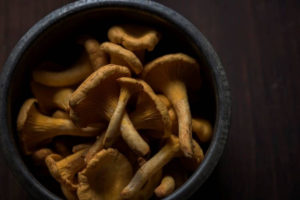
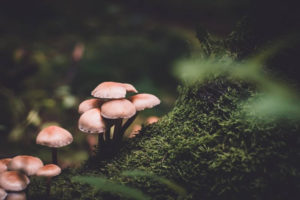
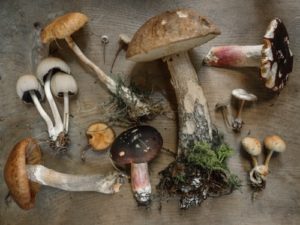
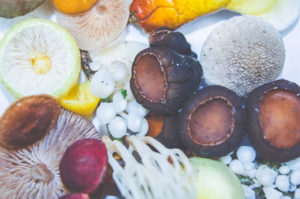
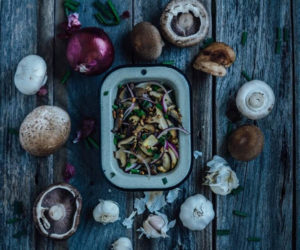
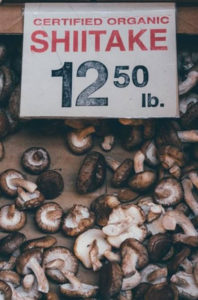
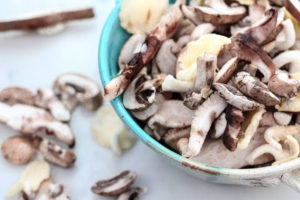


1 thought on “The Mushroom Craze: Are Medicinal Mushrooms really that good for us?”
Pingback: What Is Leaky Gut? – WellAdjusted™